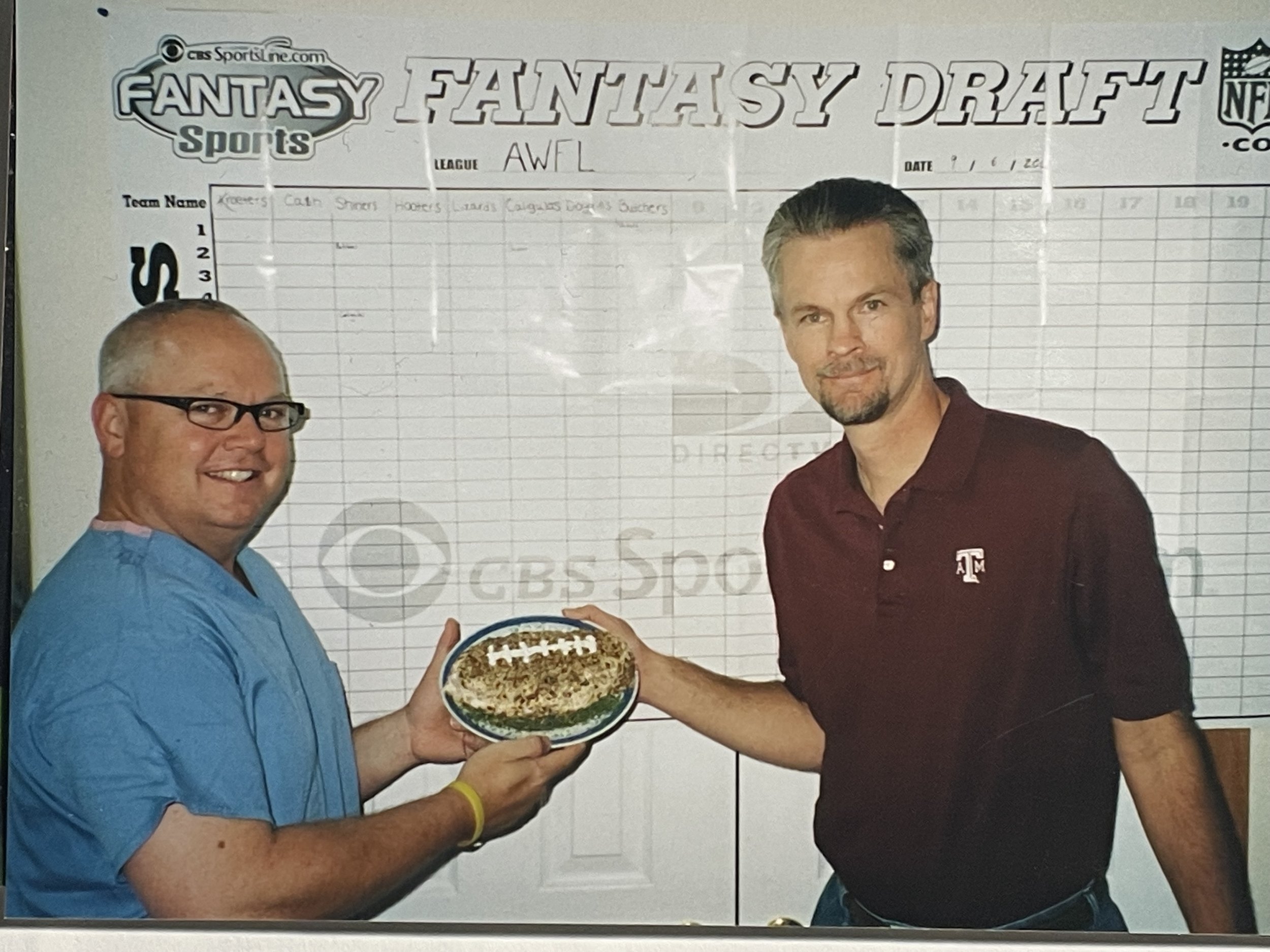
Sean Petty and the AWFL
A website and multimedia testament to one of the oldest fantasy football leagues in the country.
But first… Fantasy Football? You’ve heard these words before…
Five Things People Think When They Hear “Fantasy Football”
Fantasy Football is something you hear everyone talking about each fall, in college, in coffee shops, in bars... everywhere. It can be enough to drive people crazy? So what’s all the hype around it, anyway? Here are five commonalities of fantasy football you may have noticed or want to understand more about.
1. Draft Parties
Every point sometime in the late summer, dads across the country gather ‘round at one specific dinner table, backyard, bar or basement, each taking their rightful seats in the order they’ll all draft their players in a few hours. Everyone breaks out their computers, phones, snacks, and drinks as they count down the minutes until their fantasy league kicks off once again. These parties can have a large poster or board that gets updated throughout the draft, but they’ve slowly become outdated as drafts have moved to entirely online procedures.
2. Cheering for Players on Rival Teams?
You may know how passionate one of your friends or loved ones is for a specific team, enough so that you know very well who the rivals are. So why would they ever cheer when someone on one of those rival teams plays well? If their fantasy team, composed of many different players from different teams, (regrettably) has a player on a rival team, this makes a rare case for “grace” on that team and player if it means they can win their fantasy matchup. Take, for example, a Broncos fan who consistently picks Patrick Mahomes too early in fantasy football drafts.
3. Locked in on Computers every Sunday Morning
Every week, someone may be looking at their lineup over and over again, quickly checking rankings of players, injury reports, and debating last-minute decisions in hopes of starting the right players. Fantasy managers might be more anxious than normal, and can even appear stressed about lineup decisions that they know could swing the outcome of the matchup (which normally happens). So, if this is the case, don’t put it on yourself.
4. Emotion
One might think being able to watch football all afternoon would be a relaxing, but fun activity, especially when one has multiple reasons to want to watch more than just their favorite teams. But no, it is often quite the opposite! Especially if someone is competing in multiple leagues, they will frequently check their matchup after just about every touchdown to see if their opponent has the player who just scored. It tends to be a roller coaster all day. One that can end in either sudden heartbreak because of overtime, or a slow, painful loss as an opposing team catches up to your own score after your team’s players have already played (speaking from experience in both ways).
5. The Penalties for Losing the League
The largest, and most famous stereotype. Grown men will walk around in tutus, hold up big signs at intersections, or even spend 24 hours in an IHOP, where the only way to cut down on time is to eat pancakes. Finishing in last place at the end of the year in fantasy football can be anything from a fun prank to the most humbling experience one may ever face. It’s brutal out here. So, if one of your friends comes home one day with pink hair, and it’s early January, here's your explanation.
Let’s go back to the beginning of it all…
https://a3.espncdn.com/combiner/i?img=%2Fphoto%2F2012%2F0730%2Fmag_cp_mousalimas_576.jpgFantasy football has grown from a background pastime to essentially its own culture, that even now has an effect on the players themselves. It’s a game that has grown over sixty years, from a singular local bar, to households all over the country. It leaves many people wondering, both those who play and those who don’t. How exactly did it evolve to where it is now, and were there obstacles to overcome? Let’s go back to 1962.
According to an article published to The Fantasy Index in 1994, in New York City, a man by the name of Wilfred “Bill” Winkenbach was a partner with the then-three-year-old Oakland Raiders, meeting with two writers of the Oakland Tribune. Winkenbach had already developed similar ideas of fantasy golf and fantasy baseball, and once the idea was out there, the three men worked all night to eventually come up with official rules and regulations, giving way to what is largely agreed upon as the official birth of fantasy football.
“Though I was involved, Winkenbach deserves the lion’s share of the credit for developing the game,” Scotty Stirling, the beat reporter Winkenbach met with, said. “We chipped in with the rules, but the germ of inspiration was these earlier games he played with golf and baseball.”
George Ross, who was the sports editor for the same paper, agreed.
“It was Wink’s idea,” Ross said. “...He threw the idea out and we played around with it. [Winkenbach] was a jovial guy and we expected it would be a lot of fun.”
Though the concept was solidified in 1962, the first official draft didn’t take place until 1963. The league Winkenbach, Stirling and Ross created, the Greater Oakland Professional Pigskin Procrastinators League (GOPPPL), had its first draft in August of 1963. This was the first official fantasy football season.
For a number of years that followed until 1985, leagues were slowly made across the country. Eventually, in 1985, Grandstand Sports Services launched the first online fantasy football by way of America Online, which was then called Q-link. From there, mid-to-late ‘80s would continue to become the cornerstone of fantasy football’s growth; a national magazine fully dedicated to fantasy football called the Fantasy Football Index, written by Ian Allan. It’s still written each year, and there’s a website and blog created by the same author.
After that point, fantasy football continued to grow slowly, but surely, until 1997, When CBSSports.com created the first online competition platform, where, for a fee, a fantasy commissioner-wannabe could receive access to their own league, and all the advice, rankings, and customization they could ever want. Many other websites and organizations followed suit in attempts to compete for attention. However, given CBS required payment, some websites like Yahoo made their own competitions free, which led to much success early on.
Despite great early success and an explosion of popularity in the early 2000s, the NFL didn’t add its own free platform for fantasy football until 2017. Despite this, that same platform grew just as quickly. The ability to simply create and therefore join a league for free was what helped contribute to fantasy football’s continued spike in popularity.
Now, the most recent development since the surge of popularity for fantasy football in the 2010s has been the inclusion of betting on top of the regular game. An article published to the NFL’s official website on April 15, 2021, documents the inclusion of sports betting alongside fantasy football in a collaboration with numerous sports betting companies, such as Draftkings, Caesars Entertainment, and more.
Today, fantasy football continues to grow continuously, especially in college scenes. Some people use it to stay close with their high school friends, and some within their new college friend groups. Older and younger generations alike can convene and enjoy adding an extra element to their football watching experience. But one thing has remained the same since its creation; its team-building, trash-talking, bragging-rights seeking culture has drawn, and will draw, more attention to itself, and especially the NFL as a whole. From its origins and conception in an Oakland bar in 1962, fantasy football has come a long way into becoming one of the most popular, traditional pastimes the US has today.
With history established…
Want to understand what the heck people are saying when they’re talking about fantasy football with others? Or, do you wish to understand what ropes people in in the first place? Either way, this podcast episode offers a mellow, friendly perspective, and informational discussion between me and some of my own college friends I play fantasy football with offers plenty of insight into why people love the game so much.
Meet the ‘Commish’.
Sean Petty is a father, Texas A&M graduate, UCI Road Commission Board Member, and U.S. Bicycling Hall of Fame Inductee…
… and, of course, the commissioner and creator of the All World Football League (AWFL).
Sean and his friends, ever the creative bunch, became fully invested in the league as owners. They treated the league as a legitimate operation, with newsletters, analyses, and commentaries each week. This portrait, for example, is taken from a pre-1983 season’s “press guide”! Created in New Braunfels, Texas, in the summer of 1983, it was essential the world knew the names and faces of the owners of the self-proclaimed “Oldest Fantasy Football League in the Southwest”.
…Or this image, taken for a history book of the AWFL, created by David Boggan in 2001. As is typical in fantasy football groups, inside jokes in this history book abound, as do cherished memories and stepping stones of the league.
Even heading into 2004, friends continue to meet in-person for drafts every once in a while, as evident in this picture taken September 4th, 2004, in Colorado Springs, Colorado. These large posters, as seen in the background, would become yet another tradition of this historic fantasy football league.
So, what does this all mean, anyway?
Hear from Sean himself just how much running this league has meant to him, and how what was thought to be a fun pastime turned into that which has helped keep this Texas A&M Aggie friend group united for more than four decades.




